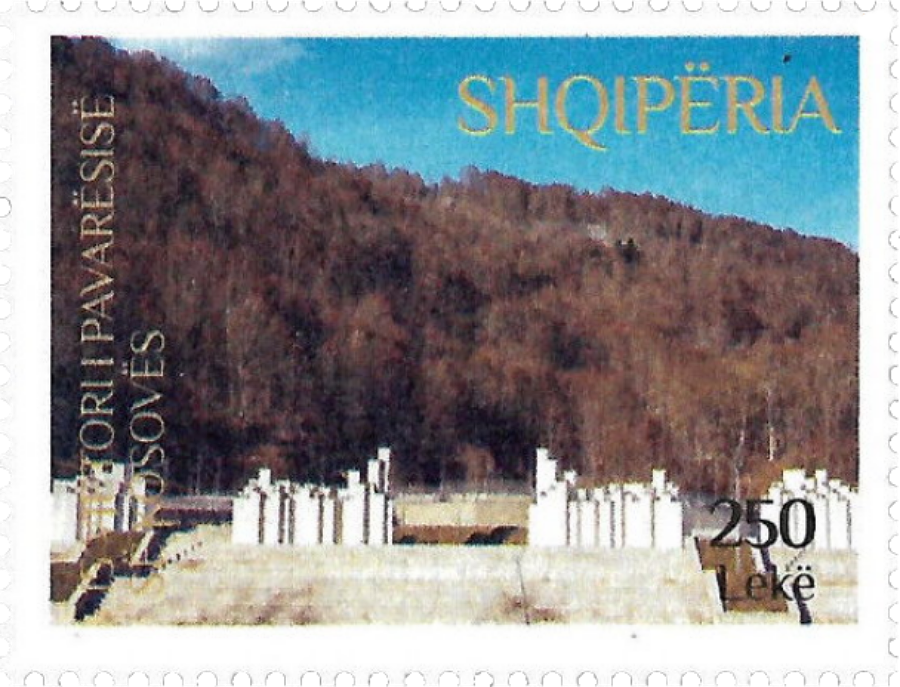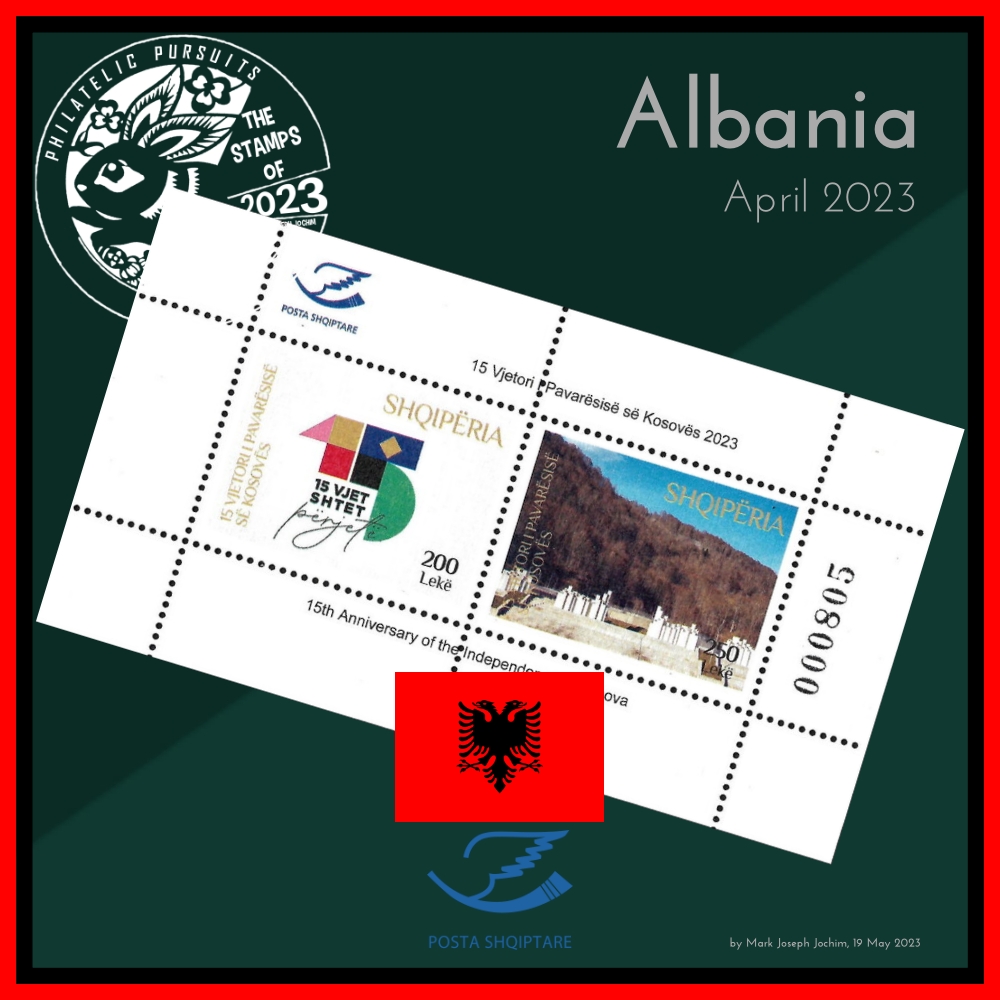
On 27 April, the national postal service of Albania — Posta Shqiptare — released a sheetlet containing two stamps to mark the 15th anniversary of the Republic of Kosovo’s independence, denominated 200 and 250 leke. These are Albania’s first stamps of 2023 and no additional issued have yet been announced although it is expected to release a stamp for the 2023 Europa series titled “Peace: The Greatest Value of Humanity”. I could not find this issue on Posta Shqiptare’s website. Please note that the stamps listed under “2021” were actually released in 2022 due to numerous delays stemming from the coronavirus pandemic.

Kosovo’s own philatelic department is going strong with an excellent website and Facebook presence. The country has released about 15 stamps in 2023 to date (its Europa issue is the only one to NOT include the common design used by all other territories so far). The Kosovo stamp marking its independence was released on 17 February, the actual Independence Day.

The 2008 Kosovo declaration of independence, which proclaimed the Republic of Kosovo to be a state independent from Serbia, was adopted at a meeting held on 17 February 2008 by 109 out of the 120 members of the Assembly of Kosovo, including the Prime Minister of Kosovo, Hashim Thaçi, and by the President of Kosovo, Fatmir Sejdiu (who was not a member of the Assembly). It was the second declaration of independence by Kosovo’s Albanian-majority political institutions; the first was proclaimed on 7 September 1990.
The legality of the declaration has been disputed. Serbia sought international validation and support for its stance that the declaration was illegal, and in October 2008 requested an advisory opinion from the International Court of Justice. The Court determined that the declaration did not violate international law, because a group of people declared independence called the representatives of the people of Kosovo, opposed to UNSCR 1244 in which is stated that Kosovo is a province of Serbia.
As a result of the ICJ decision, a joint Serbia–EU resolution was passed in the United Nations General Assembly which called for an EU-facilitated dialogue between Belgrade and Pristina to “promote cooperation, achieve progress on the path to the European Union and improve the lives of the people.” The dialogue resulted in the 2013 Brussels deal between Belgrade and Pristina which abolished all of the Republic of Serbia’s institutions in Kosovo. Dejan Pavićević is the official representative of Government of Serbia in Pristina. Valdet Sadiku is the official representative of Kosovo to Serbia.

The terms of the declaration state that Kosovo’s independence is limited to the principles outlined by the Comprehensive Proposal for the Kosovo Status Settlement, known as the Ahtisaari plan after its Finnish UN creator. It prohibits Kosovo from joining any other country, provides for only a limited military capability, states that Kosovo will be under international supervision and provides for the protection of minority ethnic communities. The original papyrus version of the declaration signed that day is in the Albanian language. The Albanian text of the declaration is the sole authentic text:
“Ne, udhëheqësit e popullit tonë, të zgjedhur në mënyrë demokratike, nëpërmjet kësaj Deklarate shpallim Kosovën shtet të pavarur dhe sovran. Kjo shpallje pasqyron vullnetin e popullit tonë dhe është në pajtueshmëri të plotë me rekomandimet e të Dërguarit Special të Kombeve të Bashkuara, Martti Ahtisaari, dhe Propozimin e tij Gjithëpërfshirës për Zgjidhjen e Statusit të Kosovës.”
English translation:
“We, the democratically elected leaders of our people, hereby declare Kosovo to be an independent and sovereign state. This declaration reflects the will of our people and it is in full accordance with the recommendations of UN Special Envoy Martti Ahtisaari and his Comprehensive Proposal for the Kosovo Status Settlement. We declare Kosovo to be a democratic, secular and multi-ethnic republic, guided by the principles of non-discrimination and equal protection under the law.”
Unlike the 1990 Kosovo declaration of independence, which only Albania recognized, Kosovo’s second declaration of independence has received 111 diplomatic recognitions, of which 15 have been withdrawn. As of 4 September 2020, 97 out of 193 (50%) United Nations (UN) member states have recognized Kosovo. However, many states have also showed their opposition to Kosovo’s declaration of independence, most notably India, China and Russia. Serbia announced before the declaration that it would withdraw its ambassador from any state which recognized independent Kosovo. Serbia, however, maintains embassies in many countries which recognize Kosovo, including Albania, Canada, Croatia, France, Germany, Hungary, Italy, Japan, the Netherlands, Norway, South Korea, Turkey, the UAE, the UK, and the US.







Leave a comment